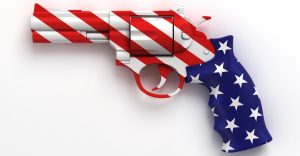Is the US gun epidemic becoming one of the world’s ‘forgotten conflicts’?
 Is the US gun epidemic becoming one of the world’s ‘forgotten conflicts’?
Is the US gun epidemic becoming one of the world’s ‘forgotten conflicts’?
Is it becoming like bomb blasts in Iraq or Afghanistan and like Boko Haram’s atrocities in Nigeria? Is gun violence in American becoming an inevitable tragedy?
It looks to be heading that way.
Consider coverage of the most recent gun violence in one of America’s leading newspapers. The New York Times left the Kentucky school shooting off the front page of its international edition. When the story appeared it had the following headline: “School Shooting in Kentucky Is Nation’s 11th of Year. It’s Jan. 23.”
Now consider the weight and importance given to the Kentucky school shooting by the BBC World Service. The story was third or fourth in its January 23 evening news bulletin. The reporting was stark – just the facts really, two 15-year-old students dead, 18 more people injured. There was little agonising or urgent commentary on how the US might move forward.
This is a significant and heartbreaking change from the way gun violence was reported before.
Before, the reportage reflected shock, horror and pain. It reflected tremulous, anxious hope that things would change. That American legislators would move to end easy access to guns, block concealed-carry laws and recall the US to the real “carnage” that threatens the land. President Donald Trump used the word “carnage” in his inaugural address on January 20, 2017, but he didn’t mean gun violence.
That is the tragedy of America now. It bears the physical and psychological scars of its biggest self-inflicted crises.
Who’s surprised that the world – and even the US itself – can hardly be bothered to report any more on this “forgotten conflict”, this struggle pitting American against American.

